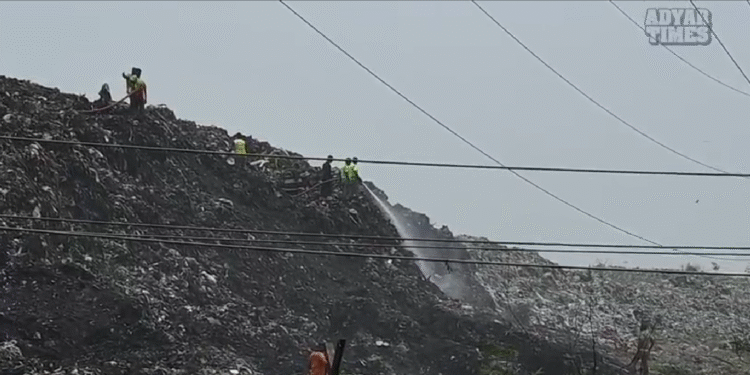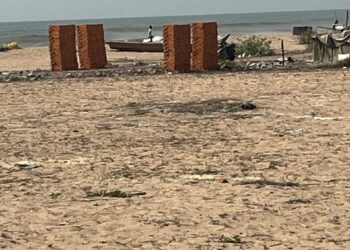Chennai, May 15, 2025 – A major fire erupted at the Perungudi garbage dump yard on the night of May 14, sending thick plumes of toxic smoke across several parts of the city. The blaze is believed to have been caused by buried plastic waste reacting to the intense summer heat, sparking concern among environmental experts and local residents.
Toxic Smoke Engulfs Surrounding Neighborhoods
Areas including Velachery, Taramani, Madipakkam, and Pallikaranai have been severely affected by the smoke. Residents have reported breathing difficulties, eye irritation, and other respiratory issues due to the poor air quality.The Tamil Nadu Fire and Rescue Services were quick to respond and are continuing efforts to bring the blaze under control. Water tankers and firefighting equipment have been deployed at the site.
The Perungudi dump yard covers an area of 228 acres and takes in unsegregated waste generated from Zones 9 to 14 of the city. Some segregation of waste is happening on site; however, with legacy waste accumulated at the venue, damage to the environment is already done.
A leaf from the past
A similar fire had broken out in May 2022, which was fueled by the various combustible gases generated in the dump yard. P.Natarajan, Founder Member of Namma Ooru Foundation had explained, “Unsegregated waste legacy has accumulated at the venue for the past nearly 25 years. Now with bio-mining, companies are digging to see if anything can be salvaged. The process of bio-mining can also produce Methane gas. This legacy waste also contains food items packed in covers, thus enabling anaerobic composting, which releases the greenhouse gas, Methane.
Apart from Methane, other gases are also produced from electronic, medical waste, plastic, glass, and clothes waste. Such gases are not only potential fire feeders, but also harmful for the workers at the venue, if and when they inhale them.”
In May 2022, post the fire, the effects of the Methane gas could also be witnessed with the growth of the Cyanobacteria or Methylobacterium in the adjacent lake, turning the lake pink. The presence of the bacteria is harmful to the aqualic ecosystem of the already polluted lake.
The way forward
Chennaiites hope that the situation is controlled at the earliest, legacy waste is cleared and there is no more dumping. Environmentalists point out that strict implementation of source segregation is the way forward, where the green (wet) waste can be composted, blue bin waste can be recycled and the red bin waste can be sent to the Corporation for appropriate disposal. Over the years, the city has also seen an increase in waste collection drives, which are a good outlet for residents to dispose of their unwanted items for recycling.
Unless stringent measures are adopted to address the legacy waste and enforce source segregation, Perungudi risks becoming a recurring nightmare for both the environment and its residents.











